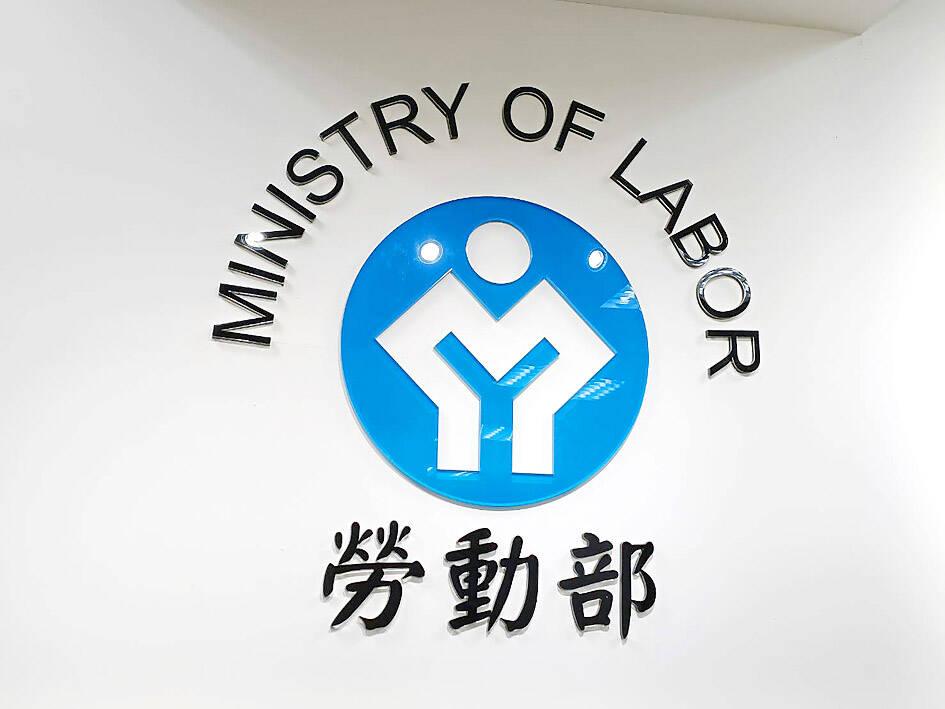The gender pay gap in Taiwan was 15.8 percent last year, an increase of 0.7 percent from 2023, with women earning an average of NT$327 per hour to the NT$389 earned by men, the Ministry of Labor said today.
The calculation is based on data from a wage survey conducted by the Directorate-General of Budget, Accounting and Statistics, the ministry said.
Women would have had to work an additional 58 days to earn the same amount as men last year, an increase of two days from 2023, it said.

Photo: Lee Chin-hui, Taipei Times
The ministry calculates an “equal pay day” every year based on this data.
This year’s equal pay day is Feb. 27, meaning that the average woman would have had to continue working from Jan. 1 to Feb. 27 to earn the same as the average man last year.
Last year’s equal pay day was on Feb. 25, the ministry said.
The gender pay gap last year was down 2.1 percent from 17.9 percent in 2011, ministry data showed.
The additional days women would need to work to earn the same as men was down eight days from 66 days in 2011.
Taiwan’s gender pay gap is lower than Japan’s 29.7 percent and South Korea’s 29 percent, the ministry said.
Some industries, such as electronics manufacturing, have a large gender pay discrepancy, the ministry said in analyzing the reasons behind the pay gap.
The gender pay gap in the electronics manufacturing industry was 41.2 percent last year, it said.
Excluding that industry, the overall gender pay gap was 11.5 percent, it said.
In other sectors such as the food and healthcare industries, wages grow differently for men and women depending on the type of job, it added.
Additional reporting by CNA

The Ministry of Foreign Affairs (MOFA) yesterday voiced dissatisfaction with the Comprehensive and Progressive Agreement for Trans- Pacific Partnership (CPTPP), whose latest meeting, concluded earlier the same day, appeared not to address the country’s application. In a statement, MOFA said the CPTPP commission had "once again failed to fairly process Taiwan’s application," attributing the inaction to the bloc’s "succumbing to political pressure," without elaborating. Taiwan submitted its CPTPP application under the name "Separate Customs Territory of Taiwan, Penghu, Kinmen and Matsu" on Sept. 22, 2021 -- less than a week after China

ALIGNED THINKING: Taiwan and Japan have a mutual interest in trade, culture and engineering, and can work together for stability, Cho Jung-tai said Taiwan and Japan are two like-minded countries willing to work together to form a “safety barrier” in the Indo-Pacific region, Premier Cho Jung-tai (卓榮泰) yesterday said at the opening ceremony of the 35th Taiwan-Japan Modern Engineering and Technology Symposium in Taipei. Taiwan and Japan are close geographically and closer emotionally, he added. Citing the overflowing of a barrier lake in the Mataian River (馬太鞍溪) in September, Cho said the submersible water level sensors given by Japan during the disaster helped Taiwan monitor the lake’s water levels more accurately. Japan also provided a lot of vaccines early in the outbreak of the COVID-19 pandemic,

A home-style restaurant opened by a Taiwanese woman in Quezon City in Metro Manila has been featured in the first-ever Michelin Guide honoring exceptional restaurants in the Philippines. The restaurant, Fong Wei Wu (豐味屋), was one of 74 eateries to receive a “Michelin Selected” honor in the guide, while one restaurant received two Michelin stars, eight received one star and 25 were awarded a “Bib Gourmand.” The guide, which was limited to restaurants in Metro Manila and Cebu, was published on Oct. 30. In an interview, Feng Wei Wu’s owner and chef, Linda, said that as a restaurateur in her 60s, receiving an

Kaohsiung Mayor Chen Chi-mai (陳其邁) on Monday announced light shows and themed traffic lights to welcome fans of South Korean pop group Twice to the port city. The group is to play Kaohsiung on Saturday as part of its “This Is For” world tour. It would be the group’s first performance in Taiwan since its debut 10 years ago. The all-female group consists of five South Koreans, three Japanese and Tainan’s Chou Tzu-yu (周子瑜), the first Taiwan-born and raised member of a South Korean girl group. To promote the group’s arrival, the city has been holding a series of events, including a pop-up